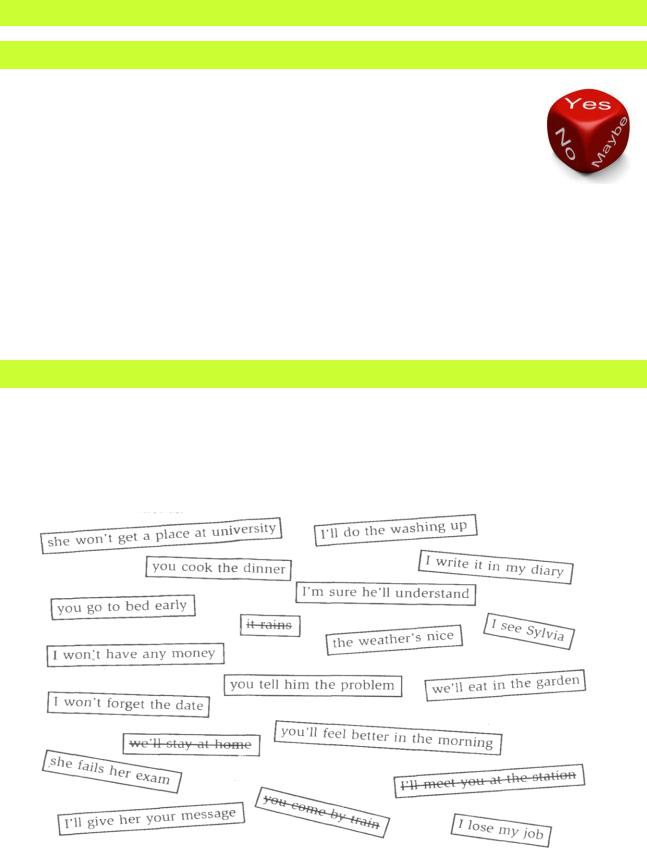
Rogozina_up2
.pdf
III. VOCABULARY
1. to launch [lɔːntʃ] |
начинать, запускать |
|
|
|||
to launch a business [lɔːntʃ ə ˈbɪznəs] |
начинать бизнес |
|
|
|
||
to launch an e-business [lɔːntʃ ən |
начать |
электронный |
бизнес, |
|||
ˈiːˈbɪznəs] |
начать торговлю через Интернет |
|||||
2. to lend [lend] smb. smth. |
одолжить, дать взаймы |
|
||||
to lend smb money |
одолжить, дать взаймы денег |
|||||
3. business plan [ˈbɪznəs plæn] |
бизнес-план |
|
|
|
|
|
Eric has an interesting idea, but he does |
У Эрика есть интересная идея, но |
|||||
not have a business plan. |
нет бизнес-плана. |
|
|
|
||
4. reason ['riːzn] for |
причина ч-л |
|
|
|
|
|
There are two main reasons for our |
Мы приняли решение по двум |
|||||
decision. |
основным причинам. |
|
|
|||
5. impossible [ɪmˈpɒsəbəl] |
невозможный |
|
|
|
||
At the moment it‟s impossible to say. |
Сейчас невозможно сказать. |
|||||
|
|
|
|
|
||
6. to offer a service [ˈɒfə ə |
предлагать услугу |
|
|
|
||
ˈsɜːvɪs] |
|
|
|
|
|
|
How many companies offer a similar |
Сколько |
компаний |
предлагает |
|||
[ˈsɪmɪlə] service? |
подобную услугу? |
|
|
|
||
|
|
|
|
|
|
|
7. customer [ˈkʌstəmə] |
клиент |
|
|
|
|
|
How many customers will he need |
Сколько |
ему |
будет |
нужно |
||
before he starts to make money? |
клиентов, прежде чем он начнет |
|||||
|
зарабатывать деньги? |
|
|
|||
8. to employ [ɪmˈplɔɪ] |
нанимать, брать на работу |
|
||||
If the site is successful, will he need to |
Если сайт |
будет |
пользоваться |
|||
employ other people? |
популярностью, нужно ли будет |
|||||
|
ему принять на работу других |
|||||
|
людей? |
|
|
|
|
|
9. staff [stɑːf] |
штат, сотрудники |
|
|
|
||
to employ new staff |
принимать |
на |
работу |
новых |
||
|
сотрудников |
|
|
|
|
|
10. studies [ˈstʌdɪz] |
учеба |
|
|
|
|
|
It is important for our son to finish his |
Важно, чтобы наш сын закончил |
|||||
university studies before he starts his |
университет, прежде чем он |
|||||
website. |
создаст свой сайт. |
|
|
|
||
11. qualification [ˌkwɒlɪfɪˈkeɪʃn] |
квалификация |
|
|
|
||
If he doesn‟t have a qualification, he will |
Если |
у |
него |
|
не |
будет |
find it difficult to get a good job. |
квалификации, ему будет трудно |
|||||
|
найти хорошую работу. |
|
||||
122

IV. COMPREHENSION CHECK
1.ANSWER THE QUESTIONS:
1.Where do the Nolands live?
2.What do they do?
3.What kind of idea has their son Eric got?
4.What did Eric ask his parents for?
5.Why has Robert Noland refused to help his son? What two reasons does he have?
6.Why is it impossible to say that Eric‟s idea will work?
7.What questions does Robert have about the site?
8.When will Robert think again about lending his son £5,000?
9.Why does he think it‟s important for Eric to finish his University studies before he starts his website?
10.What will happen if Eric leaves University without a qualification?
VEXERCISES
1.Match the boxes to make up ten sentences with if-clauses.
Examples: it rains |
we‟ll stay at home - If it rains, we‟ll stay at home. |
|
I‟ll meet you at the station |
you come by train. - I‟ll meet you at the |
|
station if you come by train. |
|
|
123

2. Use the words in brackets to make one sentence.
Example: She‟ll pay me back. She‟ll get some money. (as soon as) - She’ll pay me back as soon as she gets some money.
1.I‟ll wait here. You‟ll get back. (until)
2.Give me a ring. You‟ll hear some news. (when)
3.The TV programme will end. I‟ll do my homework. (after)
4.I‟ll go to work. I‟ll have a bath. (before)
5.She‟ll be in Paris. She‟ll visit friends. (when)
6.The lesson will end. I‟ll go home. (as soon as)
7.I won‟t leave the house. The electrician will came. (until)
8.I will feed the cats. You will be away. (while)
9.I will tell you about the holiday. I will get back. (when)
10.I will study English. I will speak it perfectly. (until)
3. Make one sentence from two sentences.
Example: You are going to leave soon. You must visit the museum before that. - You must visit the museum before you leave.
1. |
I'm going to do the shopping. Then I'll come straight home. |
|
................................................ |
|
after ............................................................................. |
2. |
I'll find somewhere to live. Then I'll give you my address. |
|
I................................................ |
|
when .......................................................................... |
3. |
It's going to start raining. Let's go out before that. |
|
Let's |
......................................... before ........................................................................ |
|
4. |
You'll be in Washington next month. You must come and see me then. |
|
................................................ |
|
when ........................................................................... |
5. |
I'm going to finish reading this book. Then I'll get the dinner ready. |
|
................................................ |
|
when ........................................................................... |
6. |
We'll make our decision. Then we'll let you know. |
|
................................................ |
|
as soon as ................................................................... |
4. Your friend is going on holiday. You are worried and have some questions to ask.
Example: What /do/ miss/ the plane? – What will you do if you miss the plane?
1.What/ do/ the plane/late?
2.Where/ stay/ hotels/ full?
3.What/ do/ not like the food?
4.Where/ go/ beaches/ crowded?
5.What/ do/ get/ sunburnt?
124

Now match your questions with the correct answers.
a)I‟ll just eat bread, cheese and fruit.
b)I won‟t sunbathe for a few days.
c)I won‟t miss it. I‟ll get there early.
d)I‟ll find a place. A youth hostel, maybe.
e)I‟ll sleep in the airport.
f)I‟ll visit the old town and the mountains.
5. Work with a partner. Student A is going skiing for the first time. Student B is worried about his/her friend. Use these ideas to help you.
What will you do?
Example: What will you do if there is no snow? – I will go for a walk.
do not like the food
it rains
don‟t learn to ski
hurt yourself
there is nothing to do in the evening
don‟t make any friends
lose your money
get lost in a snowstorm
6.A modeling agency has offered a job to a sixteen-year-old English school student, Emily. She has decided to take the job. Open the brackets using Future Simple or Present Simple.
1.„If I (not take) the job, I (not get) the chance
again,‟ she said. 2. Before she (go), she (have) a big party for all her friends. 3. „I‟m so excited,‟ she said. 4.
„When I (say) goodbye to my boyfriend, I (be) very sad.
5. But after I (arrive) in Japan, everything (be) OK.‟ 6. If she (be) successful, the agency (give) her more work.
7. „I‟ve never done this before,‟ she said, „but I‟m sure I
(be) good at it, when I (have) a little experience.‟
Emily’s boyfriend doesn’t want her to go. He thinks she will have problems.
Make sentences from the prompts.
Example: When / arrive / not speak the language. -
When she arrives, she won‟t speak the language.
125

1.If / not speak the language / not make friends.
2.If / not make friends / feel very lonely.
3.If / feel very lonely / want to come home.
4.When / come home / not have any qualifications.
Can you think of any other possible problems that Emily will have? Make sentences with if, when, as soon as, before or after.
7. Make true statements about yourself.
1.I won‟t stop studying English after…
2.I will retire when …
3.I will leave home as soon as …
4.I will be annoyed if …
5.I won‟t have children before …
6.I will have a big party if …
7.I will always live here unless …
8.I will have more free time when …
9.I will have something to eat as soon as …
10.I won‟t get married until …
8. Translate the sentences
A. 1. Я выйду на пенсию, когда мне будет 60. 2. Я устрою вечеринку, когда закончу университет. 3. Он начнет свой бизнес, когда получит квалификацию. 4. Если я буду хорошо говорить по-английски, я смогу завести друзей по всему миру. 5. Она будет очень огорчена, если не получит работу. 6. Я позвоню тебе, когда приеду домой. 7. Если завтра будет дождь, мы будем смотреть телевизор. 8. Она поможет тебе, если у нее будет время.
В. 1. Если родители одолжат мне денег, я начну электронный бизнес. 2. Когда у меня будет бизнес план, я начну торговлю через интернет. 3. Если сайт будет успешным, мы примем на работу новых сотрудников. 4. Если у него не будет квалификации, ему трудно будет найти хорошую работу. 5. Перед тем, как открыть свой бизнес, я закончу учебу в университете. 6. Если я уйду из университета, чтобы начать свой бизнес, это будет слишком рискованно. 7. Если он не получит квалификации, ему будет трудно найти хорошую работу. 8. Когда Эрик закончит учебу в университете, мы поговорим о его идее снова.
126

СПИСОК ИСПОЛЬЗОВАННОЙ ЛИТЕРАТУРЫ
1.Бонк Н.А., Котий Г.А., Лукьяновова Н.А. Учебник английского языка. В 2-х частях. Часть
1.Переиздание. М.: «ДЕКОНТ+» «ГИС», 2007. 639 с.
2.Голицынский Ю.Б. Грамматика: сборник упражнений. 6-е изд., СПб.: КАРО, 2009.
544с. (Серия «Английский язык для школьников»)
3.Clanfield, L. Straightforward. Beginner Student‟s Book. [Text]/ Clanfield, L.: Macmillan
Publishers Limited, 2007 128 p.
4.Clanfield, L., Tennant, A. Straightforward. Beginner Workbook Book. [Text]/ Clanfield, L., Tennant, A.; Macmillan Publishers Limited, 2007 72 p.
5.Clanfield, L. Straightforward. Elementary Student‟s Book. [Text]/ Clanfield, L.: Macmillan
Publishers Limited, 2006 160 p.
6.Dooley, J., Evans, V., Grammaway. [Text] / Dooley, J., Evans, V. Newbery: Express Publishing, 2000. 216 p.
7.Dooley, J., Evans, V., Grammaway 2. Практическое пособие по грамматике английского языка под редакцией профессора О.В. Афанасьевой. [Text] / Dooley, J., Evans, V. М.: «Центрком», 2000. 176 p.
8.Dooley, J., Evans, V., Grammaway 4. [Text] / Dooley, J., Evans, V. Newbery: Express Publishing, 2000. 224 p.
9.Evans, V. Round-Up 3. New and Updated. [Text]/ Evans, V.: Pearson Education Limited, 2003
– 160 p.
10.Evans, V. Round-Up 4. New and Updated. [Text]/ Evans, V.: Pearson Education Limited, 2003
– 188 p.
11.Evans, V. Round-Up 5. New and Updated. [Text]/ Evans, V.: Pearson Education Limited, 2003
– 207 p.
12.Hashemi, L., Murphy, R., English Grammar in Use. Supplementary Exercises. [Text]/ Hashemi, L., Murphy, R.: Cambridge University Press, 1995. – 126 p.
13.Murphy, R. Grammar in use. [Text] / Murphy, R. Melbourne: Cambridge University Press, 1989. 267 p.
14.Harmer, J. Just Grammar. [Text] / Harmer, J. London: Marshall Cavendish Ltd, 2004. 97 p.
15.Hartley, B., Viney, P. New American Streamline. Connections [Text]/ Hartley, V., Viney, P.: Oxford University Press, 1995 – 112 p.
16.Hartley, B., Viney, P. New American Streamline. Departures [Text]/ Hartley, V., Viney, P.: Oxford University Press, 1994 – 112 p.
17.Jones, M., Kerr, P. Straightforward. Pre-Intermediate Work Book. [Text]/ Jones, M., Kerr, P.:
Macmillan Publishers Limited, 2006 112 p.
18.Kay, S., Jones, V. Inside Out. Student‟s Book. Intermediate. [Text]/ Kay, S., Jones, V.:
Macmillan Publishers Limited, 2000 160 p.
19.Kay, S., Jones, V. New Inside Out. Student‟s Book. Pre-Intermediate. [Text]/ Kay, S. Macmillan Publishers Limited, 2000160 p.
20.Kerr, P. Inside Out. Work Book. Intermediate. [Text]/ Kerr, P.: Macmillan Publishers Limited, 200096 p.
21.Kerr, P. Straightforward. Pre-Intermediate Student‟s Book. [Text]/ Kerr, P.: Macmillan
Publishers Limited, 2006 160 p.
22.Kerr, P., Jones, S. Straightforward. Intermediate Student‟s Book. [Text]/ Kerr, P., Jones, S.:
Macmillan Publishers Limited, 2006 168 p.
23.Lott, H. Real English Grammar. The new pre-intermediate grammar [Text] / Lott, H. London:
Marshall Cavendish Education, 2006. 232 p.
24. Lott, H. Real English Grammar. The new intermediate grammar [Text] / Lott, H. London: Marshall Cavendish Education, 2005. 298 p.
127
25.Peterson, K., Andersen, B., Watts, J. Contact 2. Engelsk for volsne. Cyldental.[Text]/ Peters, J., Andersen, B., watts, J.: Copenhagen: Nordisk Forlag A.S., 1984 – 122 c.
26.Peterson Breyer, P. Grammar Work 1. English Exercises in Context. [Text]/ Peterson Breyer, P.: Prentice Hall Regents, 1995 – 148 p.
27.Peterson Breyer, P. Grammar Work 2. English Exercises in Context. [Text]/ Peterson Breyer, P.: Prentice Hall Regents, 1996 – 148 p.
28.Peterson Breyer, P. Grammar Work 3. English Exercises in Context. [Text]/ Peterson Breyer, P.: Prentice Hall Regents, 1996 – 148 p.
29.Peterson Breyer, P. Grammar Work 4. English Exercises in Context. [Text]/ Peterson Breyer, P.: Prentice Hall Regents, 1996 – 148 p.
30.Soars, L., Soars, J. New Headway. Pre-Intermediate Student‟s Book [Text]/ Soars, L., Soars, J.:
Oxford University Press, 2003 – 144 p.
31.Soars, L., Soars, J. New Headway. Pre-Intermediate Work Book [Text]/ Soars, L., Soaes, J.: Oxford University Press, 2003 – 96 p.
32.Soars, L., Soars, J. New Headway. Intermediate Student‟s Book. [Text]/ Soars, L., Soars, J.:
Oxford University Press, 2009 – 160 p.
33.Soars, L., Soars, J. New Headway. Intermediate Work Book. [Text]/ Soars, L., Soars, J.: Oxford University Press, 2009 – 102 p.
34.Soars, L., Soars, J. New Headway. English Course. Intermediate Student‟s Book [Text]/ Soars,
L., Soars, J.: Oxford University Press, 1996 – 160 p.
35.Soars, L., Soars, J. New Headway. English Course Intermediate Work Book [Text]/ Soars, L., Soars, J.: Oxford University Press, 1996 – 96 p.
36.Tennant, A. Straightforward. Beginner Workbook Book. [Text]/ Tennant, A.: Macmillan
Publishers Limited, 2006 96 p.
37.Walker, E., Elseworth, S. Grammar Practice for Elementary Students. [Text]/ Walker, E., Elseworth, S.: Pearson Education Limited, 2000 – 172 p.
38.Waterman, J. Inside Out. Work Book. Intermediate. [Text]/ Waterman, J.: Macmillan Publishers Limited, 2007112 p.
128
